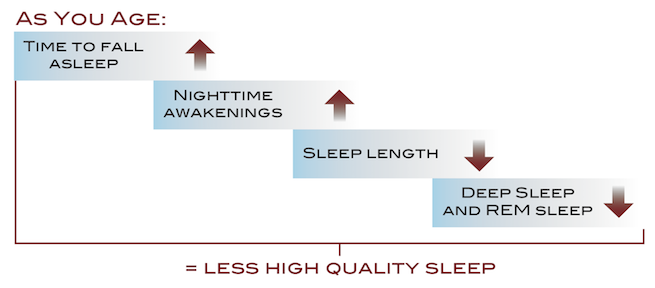Men are often unclear about the relationship between sleep and aging. Most men commonly think that the older they get the less sleep they need. On the contrary, sleep need does not decrease with age. However, sleep and aging are related in that sleep quality and quantity do tend to decrease with age. As a man ages, he takes longer to fall asleep, sleeps worse, spends less time in deep sleep and REM sleep, and experiences more nighttime awakenings.
Effect of Aging on Sleep
All of these changes related to sleep and aging mean that as you age your body and mind are less able to repair themselves during sleep. Less deep sleep means your body produces less growth hormone, and less growth hormone production means your body experiences less muscle growth/tissue repair/fat metabolism.

That’s the bad news about sleep and aging. Now the good news: it is possible to limit these negative changes to your sleep. Regular aerobic exercise and resistance exercise can decrease the time it takes to get to sleep. They also decrease the number of nighttime awakenings. Furthermore, aerobic and resistance exercise can increase the amount of deep and REM sleep you get each night. (See Aerobic Exercise and Resistance Exercise)
Men who perform resistance training have actually been shown to have a larger burst of growth hormone during deep sleep than men who do not regularly train with weights.1 Additionally, resistance exercise in men typically produces a short-term increase in testosterone and a short-term decrease in cortisol levels.2 This increase in testosterone subsequently stimulates 24-hour growth hormone release.3
Even more, resistance exercise increases the amplitude of growth hormone release independent of increases in testosterone. These nocturnal increases are believed to occur in response to tissue repair mechanisms in the body.1 By adopting a regular aerobic and resistance exercise program, you can prevent many of the negative changes to sleep that occur with aging.
A Word About Increased Nighttime Awakenings and Why They’re So Harmful!
As you age, there is an increase in the number of medical and sleep related disorders, which increase nighttime awakenings and decrease restorative sleep. Chronic medical conditions that cause pain, breathing abnormalities, and psychiatric issues all disrupt sleep. Health factors that affect sleep include cardiovascular disease, respiratory disorders, diabetes, thyroid disease, gastroesophageal disease, anxiety, depression, and sleep apnea among many others. These health problems are significant and should be handled by a medical professional. Addressing these problems with the help of a medical professional will improve overall sleep, which increases its mind- (and body-) restoring benefits.
EMG’s Sleep Homepage: Importance of Sleep
External Resources: National Sleep Foundation: Sleep and Aging
Updated: April 10th, 2015
1. McCall GE, Byrnes WC, Fleck SJ, Dickinson A, Kraemer WJ. Acute and chronic hormonal responses to resistance training designed to promote muscle hypertrophy. Can J Appl Physiol. Feb 1999; 24 (1): 96-107.
2. WD M, FI K, VL K. Exercise Physiology: Energy, Nutrition, and Human Performance. 7th ed. Baltimore, MD: Lippincott Williams & Wilkins; 2007.
3. Gentili A, Mulligan T, Godschalk M, et al. Unequal impact of short-term testosterone repletion on the somatotropic axis of young and older men. J Clin Endocrinol Metab. Feb 2002; 87 (2): 825-834.





